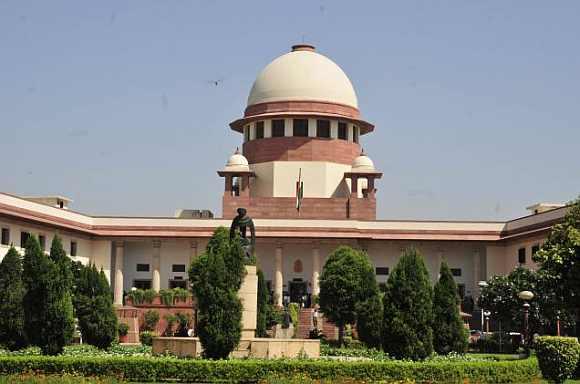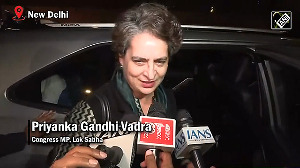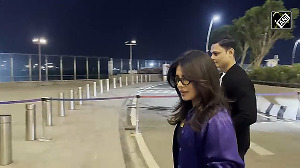 The Supreme Court on Monday decided to hear on January 27 a plea challenging the Union Cabinet’s recommendation to impose President’s Rule in crisis-hit Arunachal Pradesh moved by the Congress, which alleged that ‘illegal’ attempts have been made by the Centre and the governor to topple the Nabam Tuki government in the state.
The Supreme Court on Monday decided to hear on January 27 a plea challenging the Union Cabinet’s recommendation to impose President’s Rule in crisis-hit Arunachal Pradesh moved by the Congress, which alleged that ‘illegal’ attempts have been made by the Centre and the governor to topple the Nabam Tuki government in the state.
The petition seeking urgent hearing was mentioned before Chief Justice T S Thakur, at his residence, who directed the matter to be listed for hearing on Wednesday.
"The matter was placed before the CJI. He has listed for hearing on January 27," Virendra Kumar, deputy registrar, said.
He said listing branch of Registry will allocate the matter before an appropriate bench.
Already, a five-judge Constitution Bench headed by Justice J S Khehar is examining the scope of discretionary powers of the Governor under constitution, vis-a-vis the authority to convene assembly session with or without the aid and advice of the chief minister and his council of ministers.
The fresh plea, filed by Rajesh Tacho, chief whip of Congress Legislature Party, alleged that ‘illegal and unlawful’ attempts have been made by the Centre and Governor Jyoti Prasad Rajkhowa to topple the Nabam Tuki government.
The governor's recommendation in the present case is to promote ‘political interests of party in power at the Centre,’ the Congress petition finally settled by noted jurist Fali S Nariman said.
After the Union Cabinet on Sunday decided to recommend imposition of central rule in the state, a battery of senior lawyers including Kapil Sibal and Vivek Tankha swung into action to challenge the recommendation in the apex court.
Since the apex court is closed on Tuesday due to Republic Day, the petition through the deputy registrar was placed at 6 pm before the CJI, who preferred to get it listed on Wednesday.
The Congress has sought a direction for the Centre and the governor to furnish records pertaining to his recommendation for President’s Rule in the state.
"There is absolutely no material justifying the action under Article 356 of the Constitution of India except the personal ipse dixit (unsupported assertion) of the Respondent No.2 (Rajkhowa) who has abused the Office of the Governor by acting as an agent and the mouth piece of the central government," it said.
It has sought restoration of the Nabam Tuki government along with his Council of Ministers to office by 'reviving and reactivating' the 6th Arunachal Pradesh Legislative Assembly.
The Congress, in its plea, has further sought a direction to declare as 'illegal and void-ab-initio' any decision which may be taken during the period of central rule.
'The action of the governor is not only illegal and unconstitutional but also suffers from malice in fact and in law from bias. The respondents (The Centre and the governor) are under a constitutional mandate to act in a just and fair manner and their actions are amenable to the writ jurisdiction of this court,' the petition said.
The plea said the governor should place the 'report and material' leading to the Cabinet’s January 24 recommendation for imposition of President’s Rule in Arunachal Pradesh.
It said that if the report and the recommendation become the basis of proclamation and notification of President's Rule in the state, the same should be quashed.
'Actions/inactions on the part of the Centre and the governor directly and inevitably impact on the fundamental right of the Petitioner herein under Article 14 of the Constitution herein read with Article 21 of the Constitution, apart from encroaching upon the democratic principles of governance,' the plea said.
It also said the decision to impose central rule cannot be justified as 'there was no such immediate urgency or break down of the state machinery justifying the emergent meeting of the Cabinet on a Sunday to recommend imposition of President's Rule in the state'.
The Congress party, which has 47 MLAs in the 60-member assembly, suffered a jolt when 21 of them rebelled. Eleven Bharatiya Janata Party MLAs backed the rebels in the bid to upstage the Nabam Tuki government. Later, 14 rebel Congress MLAs were disqualified.
The governor then advanced the assembly session and convened it on December 16 in which the deputy speaker revoked disqualification of 14 rebel Congress MLAs and removed Rebia from the post of speaker. This sitting was held in a community hall in Itanagar.
Various decisions of the governor and the deputy speaker were challenged by Rebia in Gauhati high court which passed an interim order keeping in abeyance these decisions till February 1.










